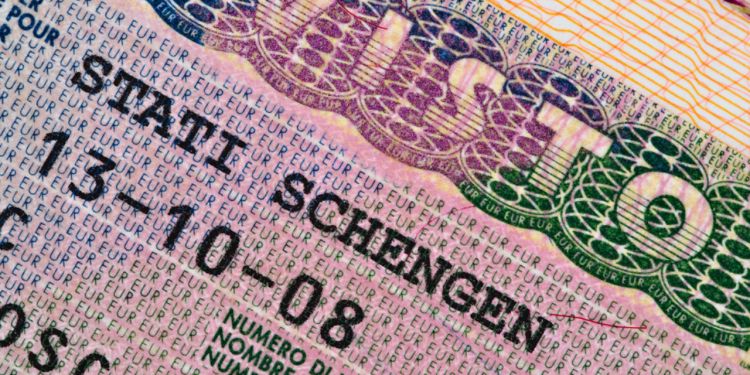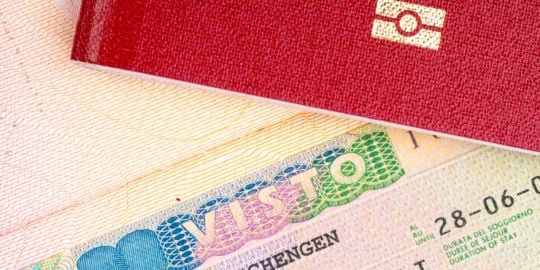Applying for a short-term Italian visa

If you have decided to stay in Italy for 90 days or less, depending on your nationality, your current country of residence, and the purpose of your trip, you may need to apply for a short-term visa for Italy, also known as a Schengen Uniform Visa. In this article, we explain what this residence permit is, what the conditions are for obtaining it, and how to apply for it.
If you are planning to stay in Italy for more than 90 days, read our article on the "Long-term visa in Italy" (National Visa).
What is the Schengen visa?
The Schengen visa is an authorization issued by a Member State of the Schengen area guaranteeing travelers entry into the same area and into the country of destination for:
- a short stay (maximum of 3 months - 90 days) in a country belonging to this area;
- transit through the territory;
- transit via an airport zone.
The visa grants three types of access:
- single entry: if you leave the Schengen area, even before the end of the 90 days, you will not be able to enter again;
- double entry: it allows you to leave the area and re-enter for a maximum of 90 days over a period not exceeding 180 days;
- multiple entries: allows you to leave and enter the area several times for up to 90 days over a period not exceeding 180 days.
These visas are issued by 27 countries belonging to the Schengen area, 23 of which, including Italy, are part of the European Union. The others are Switzerland, Liechtenstein, Norway and Iceland.
There are ten reasons why you can apply for a Schengen visa to enter Italy:
- Business
- Visiting relatives or family
- Tourism
- Medical reasons
- Airport transit
- Cultural or religious event
- Study
- Sports competition
- Official visit (e.g., diplomatic mission)
- Other: you can apply for a Schengen visa in case your trip cannot be justified by any of the reasons mentioned in the above list.
Good to know:
Visas with limited territorial validity are issued to people who seek to stay in Italy for humanitarian reasons, national interest, or by virtue of certain international obligations. They are issued by the diplomatic or consular representative of the country.
How to obtain a Schengen visa for Italy?
The Schengen visa application must be submitted to the Italian consulate or embassy of the country of origin of any person wishing to enter Italy. In order to know the specific requirements of your country of origin for planning your trip to Italy, consult the website of the Italian Ministry of Foreign Affairs, the Farnesina. Depending on your country of origin, you will get an overview of the procedures and documents required to apply for your residence permit.
Generally, the application for a Schengen visa is made at the Italian representation of the applicant's country, in this case, an embassy or consulate. When submitting the application, you need to follow certain procedures and provide the following documents:
- a duly completed and signed application form (the form is available on the Farnesina e-application) ;
- recent passport photos;
- a copy of an identity document, ideally your passport, the validity date of which must exceed by at least three months the duration of the trip you plan to make to Italy;
- a return ticket (or reservation), i.e., proof of personally planned means of transport;
- proof of sufficient funds for the duration of your stay (details of which are given on page 3 of the Directive on the entry and stay of foreigners in Italy);
- documents that attest to your socio-professional situation in your country of origin;
- proof of international health insurance valid throughout the Schengen area, which covers at least €30,000 of expenses in case of emergency hospitalization and repatriation;
- proof of accommodation in Italy (hotel reservation, declaration of hospitality by an Italian resident, or declaration of payment of accommodation costs by the person inviting the foreign citizen).
Depending on local agreements in force in some countries, the documents required for Schengen visa applications may vary. Please contact the Italian Consulate or Embassy in your country of origin for further information, including the time required to issue your visa.
The administrative fee for processing the Schengen visa application is €80 for adults and €40 for children aged 6-12. Students and children under the age of six are exempt from the visa fee.
Visa exemptions in Italy
If you wish to stay in Italy for less than 90 days, you may be exempt from applying for a visa. Citizens of the European Union, the EEA and Switzerland are among the foreign nationals who do not need to apply for a Schengen visa to enter Italian territory.
In addition, other citizens from certain countries are covered by a Schengen visa exemption agreement for Italy. These are the following:
Albania, Andorra, Antigua and Bermuda, Argentina, Australia, Bahamas, Barbados, Bosnia and Herzegovina, Brazil, Brunei, Canada, Chile, Colombia, Costa Rica, Dominica, El Salvador, Georgia, Grenada, Guatemala, Honduras, Hong Kong, Israel, Japan, Kiribati, Macedonia, Malaysia, Macau, Mauritius, Marshall Islands, Solomon Islands, United Arab Emirates, United States of America, Mexico, Micronesia, Moldova, Monaco, Montenegro, Marshall Islands, New Zealand, Nicaragua, Nauru, Palau, Panama, Paraguay, Peru, Saint Kitts and Nevis, El Salvador, Saint Lucia, Saint Vincent and the Grenadines, Samoa, San Marino, Serbia, Seychelles, Singapore, Taiwan, Timor-Leste, Tonga, Trinidad and Tobago, Tuvalu, Ukraine, United Kingdom
Depending on your country of origin, you may not need to apply for a visa if you intend to stay in Italy for a maximum of 3 months, i.e., 90 days or less, and the reason for your stay is one of the following: tourism, official mission, business, family visit, medical reasons, airport transit, cultural event, sports competition or study.
Important:
Foreigners from countries outside the Schengen area wishing to stay in Italy must always be able to:
- present proof of the reason for their presence in Italy;
- present an identity document, such as a valid passport that expires at least three months after the planned date of departure from Italy.
To find out if your country of citizenship is covered by the visa waiver agreement, answer the short questionnaire proposed on the Italian Ministry of Foreign Affairs website. Countries not covered by the visa waiver agreement are also listed on the Visa Info Schengen website.
All other citizens must apply for a uniform Schengen visa as a residence permit to enter Italy.
Good to know:
You can apply for a visa up to three months before the date of departure to Italy. Depending on your nationality, processing time can take between two and ten working days from the date of application.
Useful links :









